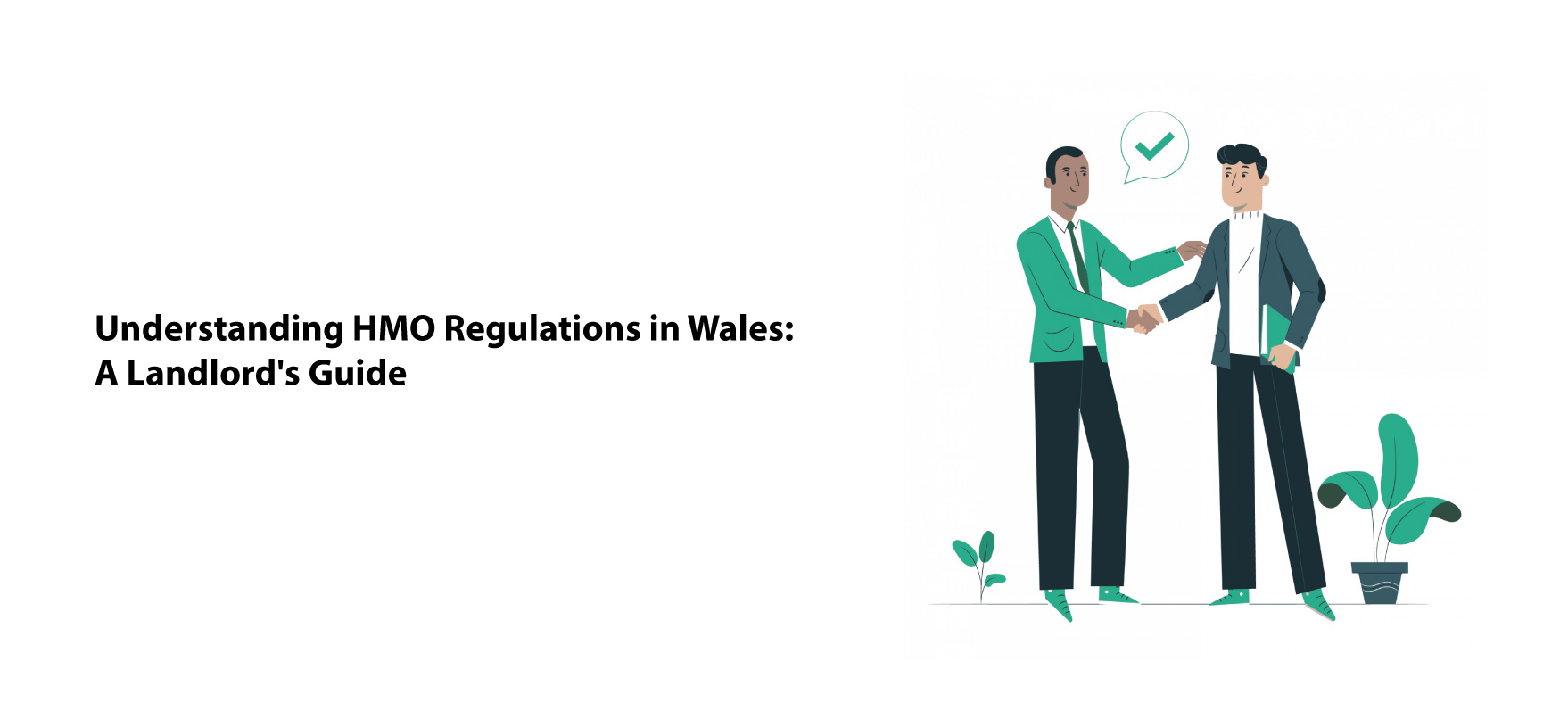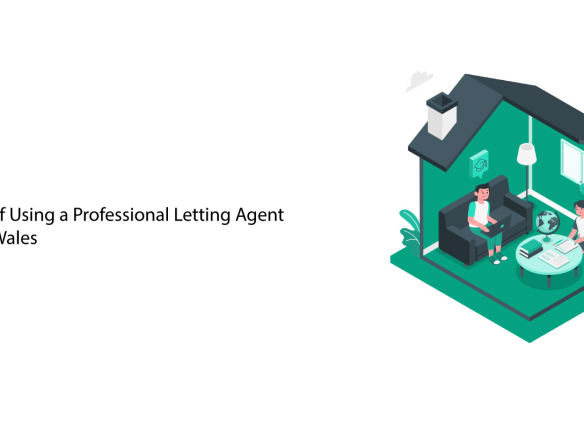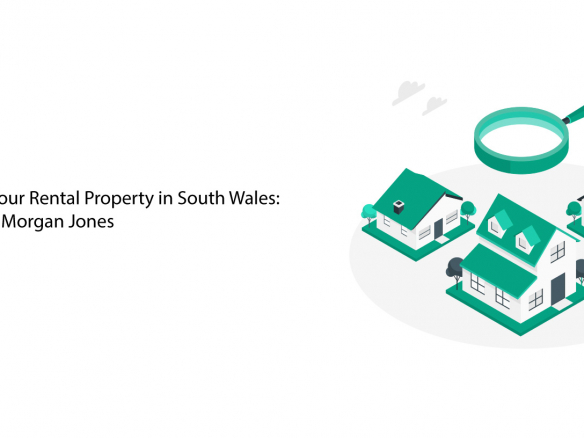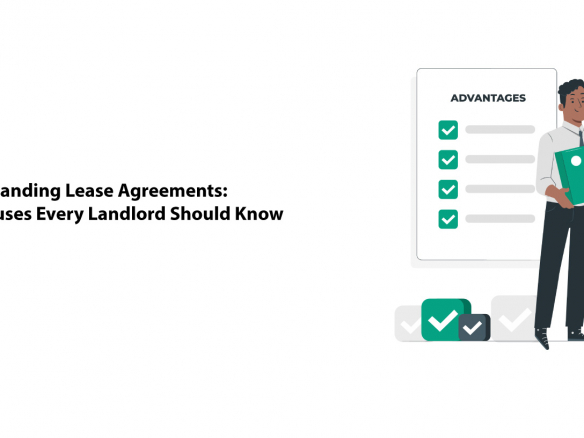A House in Multiple Occupation (HMO) is a rental property shared by three or more tenants not part of the same household (i.e., they are not family members). Each tenant typically has a private bedroom but shares common areas such as the kitchen, bathroom, and living room. HMOs are an increasingly popular housing option in Wales, particularly among students and young professionals, due to their affordability and communal living setup.
Understanding and complying with the HMO regulations in Wales is crucial for landlords. These regulations are designed to ensure that properties meet stringent safety, welfare, and management standards, providing tenants a safe and comfortable environment. Compliance is not only a legal requirement but also a critical component in protecting landlords from potential fines and legal actions and maintaining the integrity and profitability of their rental investments.

What Qualifies as an HMO in Wales?
Defining HMOs Under Welsh Housing Laws
In Wales, a property is defined as an HMO if it is rented out by at least three people who are not from one ‘household’ (i.e., a family) but share facilities like the bathroom and kitchen. It’s also classified as an HMO if rented to five or more people, forming more than one household. This includes any house split into bedsits, a shared house or flat where tenants have separate tenancy agreements or student-shared housing.
Types of Properties Typically Qualifying as HMOs
Typically, the properties that qualify as HMOs include:
- Shared Houses: Common among students and young professionals.
- Converted Flats: Buildings converted into non-self-contained flats where facilities are shared.
- Bedsits: Where each tenant has their own room but shares kitchen and bathroom facilities.
- Hostels and Bed & Breakfast Hotels: These are used as tenants’ main residences.
- Purpose-Built Flats: Particularly those with shared facilities, although there are exceptions depending on the number of flats in the block.
Relevance of HMO Status in Rental Business Operations
Classifying a property as an HMO carries significant implications for rental business operations. Firstly, HMOs are subject to additional regulatory requirements, including mandatory licensing, which ensures that the property meets higher safety and management standards. These requirements protect tenants and ensure the property is suitable for multiple occupants.
Operating an HMO can be more lucrative for landlords due to potentially higher rental income streams from multiple tenants. However, it also involves more complex management tasks, including ensuring compliance with stringent health and safety regulations and potentially higher maintenance costs.
Licensing Requirements for HMOs
The Licensing Process for HMOs in Wales
In Wales, obtaining a license for an HMO is mandatory if the property is occupied by three or more tenants forming more than one household. The licensing process is designed to ensure that the landlord is fit and proper to hold a license and that the property is managed correctly and meets safety standards. The process involves several steps:
- Application Submission: Landlords must apply to the local council where the property is located. The application should include detailed information about the property, its ownership, and the proposed management arrangements.
- Property Inspection: Once the application is submitted, the local council will arrange an inspection of the property to ensure it meets the required standards for safety, size, and facilities.
- Compliance with Standards: The property must comply with fire safety regulations, have adequate water supply and drainage, and provide suitable cooking and washing facilities. The property’s condition and management practices are also assessed.
- Approval and Issuance: The council will issue an HMO license if the property meets all the requirements. This license typically needs to be renewed every five years.
Criteria for Obtaining an HMO License
To obtain an HMO license, landlords must meet the following requirements:
- Ensure the property meets or exceeds the minimum physical standards set by the local council.
- Demonstrate adequate management arrangements, including dealing with tenant issues and maintaining the property.
- Provide proof that safety measures, such as smoke alarms and carbon monoxide detectors, are installed and regularly tested.
- Show that all occupiers have access to adequate facilities and space in line with the number of tenants.
How and Where to Apply for HMO Licensing
Landlords can apply for an HMO license through their local council’s housing department. Most councils offer online applications through their websites, where forms and further guidance on the application process can be found. Fees for HMO licensing vary between councils and are usually based on the size of the property and the number of occupants.

Local Variations and Additional Requirements
It’s important to note that specific requirements for HMO licensing can vary significantly between different councils in Wales. Some areas may have additional standards or requirements based on local housing conditions or policies. For example, a council might require additional safety measures in student-heavy areas or stricter management standards in regions with a high density of HMOs. Landlords are advised to contact their local council directly to get detailed and specific information regarding the requirements in their area.
Safety Standards and Compliance
Essential Safety Standards for HMOs
For HMOs in Wales, maintaining high safety standards is a legal requirement and a crucial aspect of protecting tenants and ensuring the property’s viability as a rental investment. Key safety standards include:
- Fire Safety: HMOs must be equipped with appropriate fire safety measures, including fire alarms, smoke detectors, and fire extinguishers. Escape routes must always be clear, and fire safety equipment should be regularly tested and maintained.
- Gas Safety: Annual gas safety checks are mandatory and must be carried out by a Gas Safe registered engineer. Landlords must provide tenants with a copy of the gas safety certificate within 28 days of the inspection.
- Electrical Safety: Electrical systems and appliances must be inspected and tested by a qualified electrician at least every five years. Landlords must ensure that all electrical installations and appliances are safe throughout the tenancy.
Landlord Responsibilities for Safety Inspections and Records
Landlords of HMOs are responsible for ensuring that their properties comply with all relevant safety standards and for maintaining up-to-date safety records. Responsibilities include:
- Scheduling regular safety inspections and ensuring that any identified issues are addressed promptly.
- Keeping comprehensive records of all property safety inspections, maintenance, and repairs. This documentation is crucial not only for compliance purposes but also for addressing any disputes or legal issues that may arise.
- Provide tenants with valid copies of safety certificates and ensure they know their safety measures and responsibilities.
Other Compliance Issues
In addition to safety standards, landlords must also adhere to other regulatory requirements to ensure their HMOs are compliant:
- Room Size Regulations: Depending on the age and number of occupants, bedrooms must meet specific minimum size requirements. Overcrowding can lead to significant penalties.
- Amenities: Adequate cooking and sanitation facilities must be provided. This includes sufficient bathrooms and cooking facilities relative to the number of tenants.
- Waste Disposal Requirements: Proper provisions must be made for storing and disposing of waste and recycling. Landlords should provide suitable bins and ensure regular waste collection to maintain sanitary conditions.

Adhering to these safety and compliance standards is essential for the legal and successful management of an HMO in Wales. By ensuring that properties meet these rigorous standards, landlords safeguard their tenants’ well-being and enhance the reputation and desirability of their rental offerings.
Managing Tenants in an HMO
Managing Tenant Relationships in an HMO Setting
Effective tenant management is critical in houses in multiple occupations due to communal living arrangements. Here are some tips for fostering positive relationships among tenants:
- Clear Communication: Establish open lines of communication with your tenants. Regular updates and responsiveness to inquiries can prevent misunderstandings and ensure a harmonious living environment.
- Tenant Meetings: Regularly scheduled meetings can help address communal concerns and foster community. They also provide a platform for tenants to voice any issues and participate in decision-making about the living environment.
- Conflict Resolution Strategies: Proactively manage conflicts by mediating disputes fairly and promptly. Establishing clear guidelines for behaviour and responsibilities can help prevent many common conflicts.
Legal Obligations of Landlords in HMOs
Landlords of HMOs have specific legal obligations to ensure the safety, security, and well-being of their tenants:
- Privacy: Respect tenant privacy by notifying tenants before visits for inspections or maintenance. Ensure that all surveillance measures, such as security cameras in public areas, comply with privacy laws.
- Security: Provide secure locks on doors and windows, adequate lighting, and safety measures to protect tenants and their belongings.
- Maintenance: Ensure that the property is in good repair and that any problems tenants report are addressed promptly. Regular maintenance checks can prevent significant issues and ensure the property meets health and safety standards.
Handling Common Challenges in HMO Management
Managing an HMO involves unique challenges that require thoughtful strategies:
- High Turnover Rates: To minimise turnover, focus on tenant satisfaction through regular maintenance and upgrades, fair rent pricing, and good tenant relationships.
- Maintenance Issues: Due to shared facilities, maintenance issues can be more frequent in HMOs. Implement a system for tenants to report issues easily and address these problems promptly to keep the property functional and tenants happy.
- Compliance with Safety Regulations: Regularly review your property’s compliance with the latest safety regulations. Non-compliance can lead to legal issues and put tenants at risk.
Effectively managing an HMO requires a hands-on approach and a deep understanding of legal obligations and tenant needs. By maintaining high management standards, landlords can ensure their HMO properties comply with regulations and provide a pleasant and safe living environment for tenants.

Penalties for Non-Compliance
Consequences of Failing to Comply with HMO Regulations
Non-compliance with HMO regulations can lead to significant legal and financial implications for landlords in Wales. The penalties can vary based on the severity and nature of the violation but typically include:
- Fines: Landlords can face substantial penalties if they do not obtain the necessary HMO license or fail to meet safety and health standards. For serious breaches, fines can reach up to £20,000.
- Rent Repayment Orders (RROs): Tenants or the local authority may apply for an RRO, requiring landlords to repay up to 12 months of rent if they are found to be operating an unlicensed HMO or breaching licensing conditions.
- Criminal Prosecution: In severe cases, landlords may face criminal charges, especially for breaches that endanger tenant safety. This could lead to even higher fines and, in extreme cases, imprisonment.
Resources and Support for HMO Landlords
Navigating the complex landscape of HMO management in Wales requires access to comprehensive resources and professional support. Here’s a guide to essential resources and services available to HMO landlords in Wales:
Governmental and Legal Resources:
- Welsh Government Website: This website offers detailed guides and official documentation on HMO regulations, licensing requirements, and compliance checklists.
- Local Councils: Each local authority in Wales provides specific guidelines and support for HMO landlords. Landlords should consult their local council’s housing department for tailored advice and support.
- Residential Landlords Association (RLA): This association offers training courses, up-to-date news, and legislative updates specifically designed for landlords in Wales.
- Citizens Advice: Provides free advice on legal and compliance issues related to HMO management, helping landlords understand their rights and responsibilities.
Professional Services and Organisations:
- Morgan Jones Specialises in property management, including comprehensive HMO management services. It can assist with everything from obtaining HMO licenses to ensuring compliance with all safety and health standards, providing landlords with peace of mind.
- Property Redress Scheme: This scheme is a must for any landlord. It offers dispute resolution services and assistance in case of conflicts between landlords and tenants.
- Chartered Institute of Housing (CIH): This organisation offers professional development and networking opportunities for HMO landlords, helping them stay informed about industry standards and best practices.
Support Services:
- Safety Inspection Experts: Professional services that provide regular safety inspections and certifications, ensuring HMOs comply with the latest fire, gas, and electrical safety standards.
- Legal Firms Specialising in Property Law: Can offer crucial legal advice and representation, particularly useful in navigating the complexities of HMO regulations and defending landlords in disputes.
By leveraging these resources and engaging with professional organisations such as Morgan Jones, HMO landlords in Wales can effectively manage their properties, ensuring compliance with regulations and providing safe, high-quality housing to their tenants. These supports help maintain legal standards and enhance the overall profitability and sustainability of rental investments.

Are you managing an HMO in Wales and need expert guidance to ensure compliance and optimise your property management?
Visit our Contact Page or contact us at 01792 651311 to start the conversation. Let Morgan Jones guide you through every step of your property investment journey, ensuring success and satisfaction in the competitive Welsh real estate market.








Join The Discussion